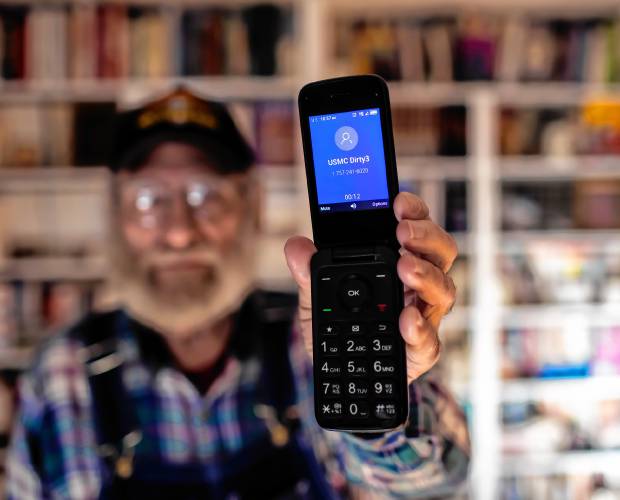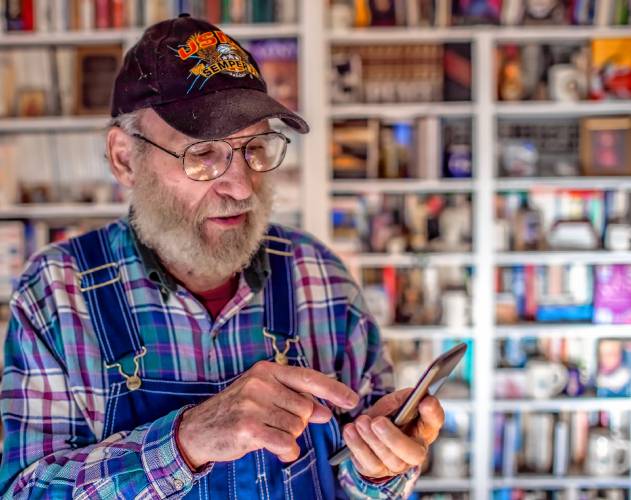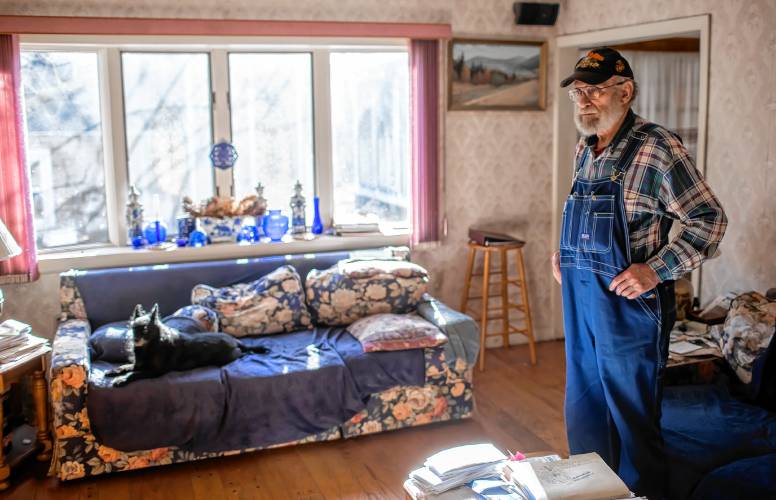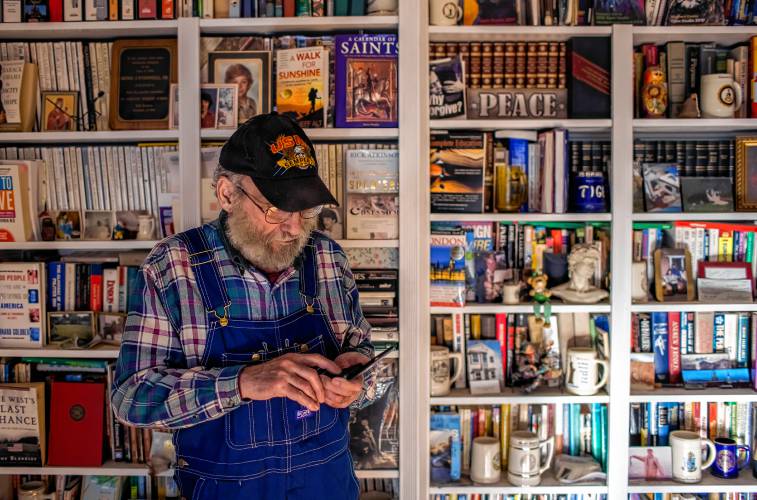Concord veteran, 82, who served at Camp Lejeune fighting to get answers
|
Published: 01-15-2024 12:00 PM
Modified: 01-16-2024 12:14 PM |
Former Marine Denis O’Connell felt ignored.
He hoped someone – anyone – would answer his phone call seeking information about payments to Marines who had developed cancer from toxic water after serving at Camp Lejeune from 1953 to 1987. The base is a sprawling training facility in North Carolina for the Marines and the Navy.
O’Connell grew tired of the dead ends on the phone, of voicemails left, of recordings he heard, and of beeps that had no obvious purpose. Like a lot of Marines his age, he’s old school. He wanted to talk to a human being. Asking someone to call him back didn’t seem like too much to ask.
He did his best to maneuver through an arduous process, keeping a log of all the times he called, the numbers he dialed, the recordings he heard and the messages he left. After weeks of trying, he was unsuccessful in getting anyone from the military on the phone to speak to him about the lung and bladder cancer he’s been diagnosed with recently, after a 15-month stint at Lejeune in 1959 and 1960.
Law firms announcing their service to any veteran or family member who qualifies for compensation have saturated the airwaves and given the cause a high profile, for a blunder of historic proportions.
That only added to O’Connell’s frustration. He said one particular law firm wanted 40 percent of any settlement.
“I told them that that was criminal and dropped them,” O’Connell said.
O’Connell said the law firm he’s using asked for a more reasonable 25% payout.
Article continues after...
Yesterday's Most Read Articles
 Restaurant owner settles lawsuit against Franklin, but didn’t get what she sought
Restaurant owner settles lawsuit against Franklin, but didn’t get what she sought
 Trump’s order to end homelessness could overwhelm New Hampshire’s mental health system, advocates say
Trump’s order to end homelessness could overwhelm New Hampshire’s mental health system, advocates say
 With Steeplegate still held up in court, city privately debates public investment
With Steeplegate still held up in court, city privately debates public investment
 Former Castro’s building to hold apartments and the cigar shop will return, eventually
Former Castro’s building to hold apartments and the cigar shop will return, eventually
 ‘Peace of mind’: As New Hampshire nixes car inspections, some Concord residents still plan to get them
‘Peace of mind’: As New Hampshire nixes car inspections, some Concord residents still plan to get them
 Education commissioner nominee Caitlin Davis receives unanimous bipartisan support on eve of confirmation vote
Education commissioner nominee Caitlin Davis receives unanimous bipartisan support on eve of confirmation vote
O’Connell was trying to find out if he missed an important deadline, or if he still qualified for payment. He’s made dozens of phone calls to Navy and Marine-related agencies in recent months and says most calls were merely recorded messages or beeps.
“They promise to call you back in 48 hours,” O’Connell said. “They never wrote to me or called me back. And then a week goes by and it’s like, ‘Holy cow, Batman. This leads to nowhere.’ ”
His anger is clear. He’s lost immediate family members through awful tragedies and served his country in the Marines, from 1958 to 1962, in a medium support company of the 2nd Service Battalion, Barracks 500.
Now he’s got cancer. His most recent diagnosis showed that his bladder cancer was in remission, but then it came back. He said he’s still waiting for a final prognosis on his lung cancer.
President Joe Biden signed a law on Aug. 10, 2022, creating the opportunity for those who were stationed at Lejeune for the 34-year stretch and eventually had gotten sick to receive compensation.
The list of covered illnesses includes multiple types of cancer, including bladder cancer, Lou Gehrig’s Disease, Parkinson’s Disease and Non-Hodgkin’s lymphoma.
O’Connell heard about deadlines to file and cutoffs for a diagnosis after a certain date. He received his first cancer diagnosis, lung cancer, in July of 2022, and his diagnosis of bladder cancer in February of 2023.
He wanted to make sure he was covered.
Early on, he read both Marine and Navy material. He read conflicting reports that only angered him further.
“The Marine Corps literature states that lung cancer and bladder cancer will be covered and there will be no deadline dates associated with it,” O’Connell said. “There’s Navy material that says bladder cancer won’t be covered because of a deadline.”
There were other phone calls made and emails sent to officials of both branches of the military, to law firms who might take his case, to anyone who might help penetrate the red tape and bureaucracy.
His messages went to “Never Never Land,” O’Connell said.
He called the state office of Veterans Services and left a message. O’Connell even contacted Sen. Jeanne Shaheen’s office. Protocol had to be followed, O’Connell was told. He’s still waiting on that as well.
In an email, The Office of the Navy Judge Advocate General said to call Patricia Babb, the Director of Communication Strategy and Operations for the Marines. They wouldn’t discuss O’Connell’s case directly, but pointed to online information for veterans who may have a claim.
Asked if money would be paid to those diagnosed with bladder cancer just six months after the Aug. 22, 2022 deadline for diagnosis, Babb wrote, “The Camp Lejeune Justice Act does not in any way limit the illnesses for which individuals can file claims.”
On the phone, the more O’Connell discusses his experience the more animated he becomes. He emailed updates of his efforts to get a human being on the phone, often typing in capital letters to convey his point.
Other times, talking about his life of 82 years, he wove through memories of growing up on the tough streets of Brooklyn. He spoke about his five children. He’s got two sons in Florida and a daughter who lives in Derry.
At his Concord home, O’Connell moved to a shelf, picked up a picture frame and said, “This is what I lost.”
The photo showed his other two sons, red-headed brothers, twins. One, Joseph Bryan, died in 1976 from a brain tumor. The other, James Andrew, died in a car wreck in 1986.
They would have been 55 last month. O’Connell regretted not speaking openly to James about the loss of his twin, Joseph.
He’s been divorced from his second wife for 10 years. He insisted he wasn’t lonely, but his sensitive side, stashed in the back of his mind, emerged when it came to family.
One mention of Camp Lejeune and O’Connell snapped back into fighting mode.
More than anything, O’Connell merely wants to get clear answers to his questions, make him feel more confident, or at least tell him if he was approved as a candidate for a payout or stop wasting his time.
“They’re going to settle claims of $500,000 or less,” O’Connell relayed from his research. “If you want over $500,000, you’ve got to file a court date and we’re not in that scenario right now. We filed such that I’m hoping for a settlement of some sorts.”
His bladder cancer came back he learned last week. He’ll be re-examined every three months. His lung cancer will be scanned every six months.
O’Connell wrote an email to the Monitor recently. He gained some hope and optimism. He had just gotten a message on his phone saying someone would call him back within 48 hours.
This was an official from the United States Marine Corps who left a voicemail on O’Connell’s cell.
A real person.
“It went to voice mail as I was LITERALLY getting a new cellphone at the moment!” O’Connell’s note said.
He was told to call a number he had already tried months ago without luck. A new message, he was told, would be more helpful. A “dramatically changed” message, O’Connell said.
“They ask everyone to leave a (message),” O’Connell said, “and they will get back to you ASAP NO MATTER YOUR QUESTION/SUBJECT!”
Soon, though, a follow-up note from O’Connell showed that he remains leery and frustrated. He’s not finished. He has no idea where this is going.
“I’m NOT optimistic that I will get a call,” O’Connell wrote. “I do plan to call every now and then to see if the voice or message changes again! I want an ‘A’ for trying.”
The number for veterans to call to file a Camp Lejeune claim is 757-241-6020.











 Summer camp offers support and adventure for children being raised by grandparents: ‘These kids got to be kids’
Summer camp offers support and adventure for children being raised by grandparents: ‘These kids got to be kids’ ‘Best day of the year’: Canterbury celebrates 67th annual country fair
‘Best day of the year’: Canterbury celebrates 67th annual country fair Mullet madness: Young man who died in motorcycle accident remembered at local fundraiser
Mullet madness: Young man who died in motorcycle accident remembered at local fundraiser ‘Entire paradigm has to shift’: Majority of parents express support for phone ban, but predict rocky rollout
‘Entire paradigm has to shift’: Majority of parents express support for phone ban, but predict rocky rollout
